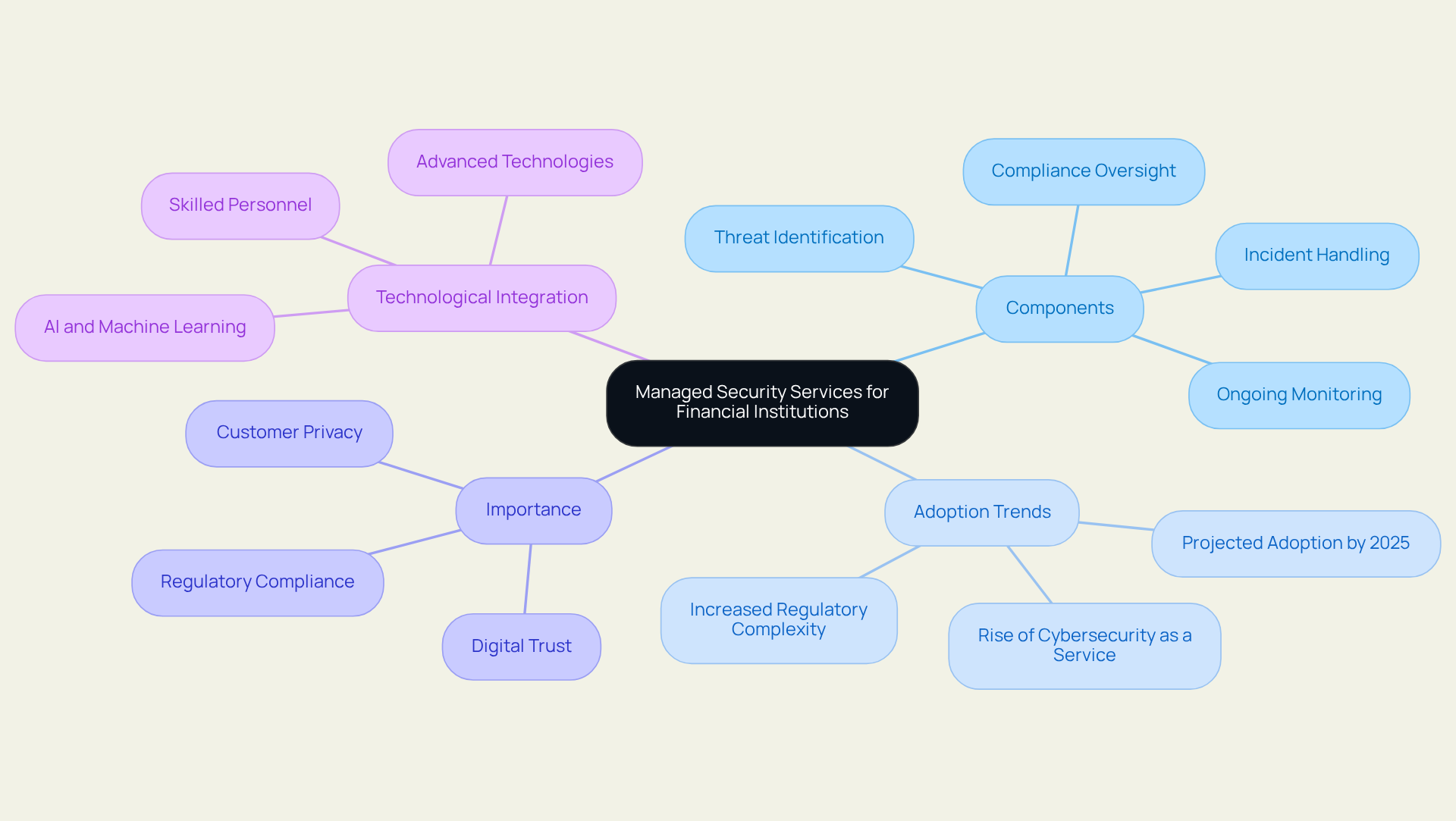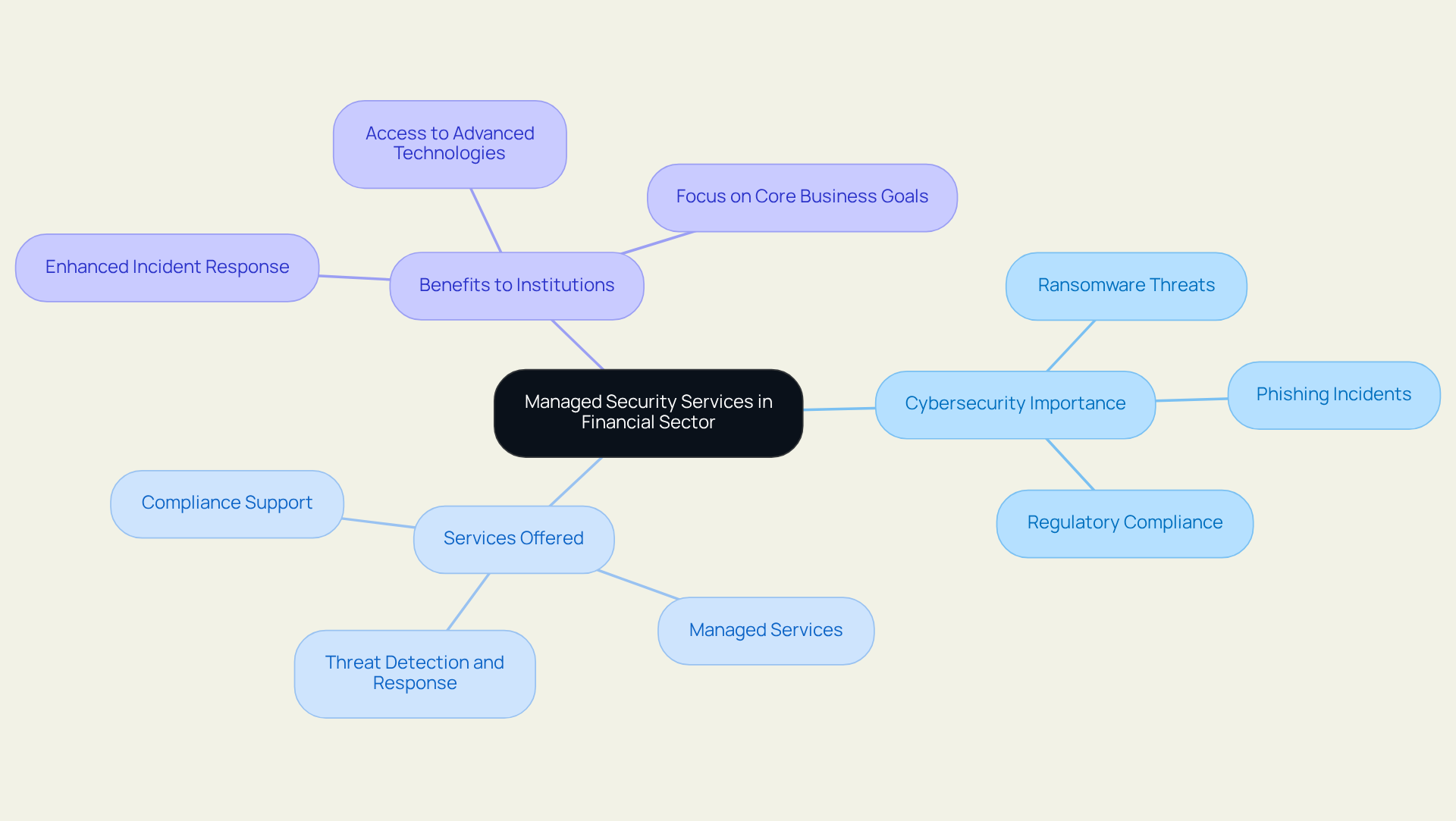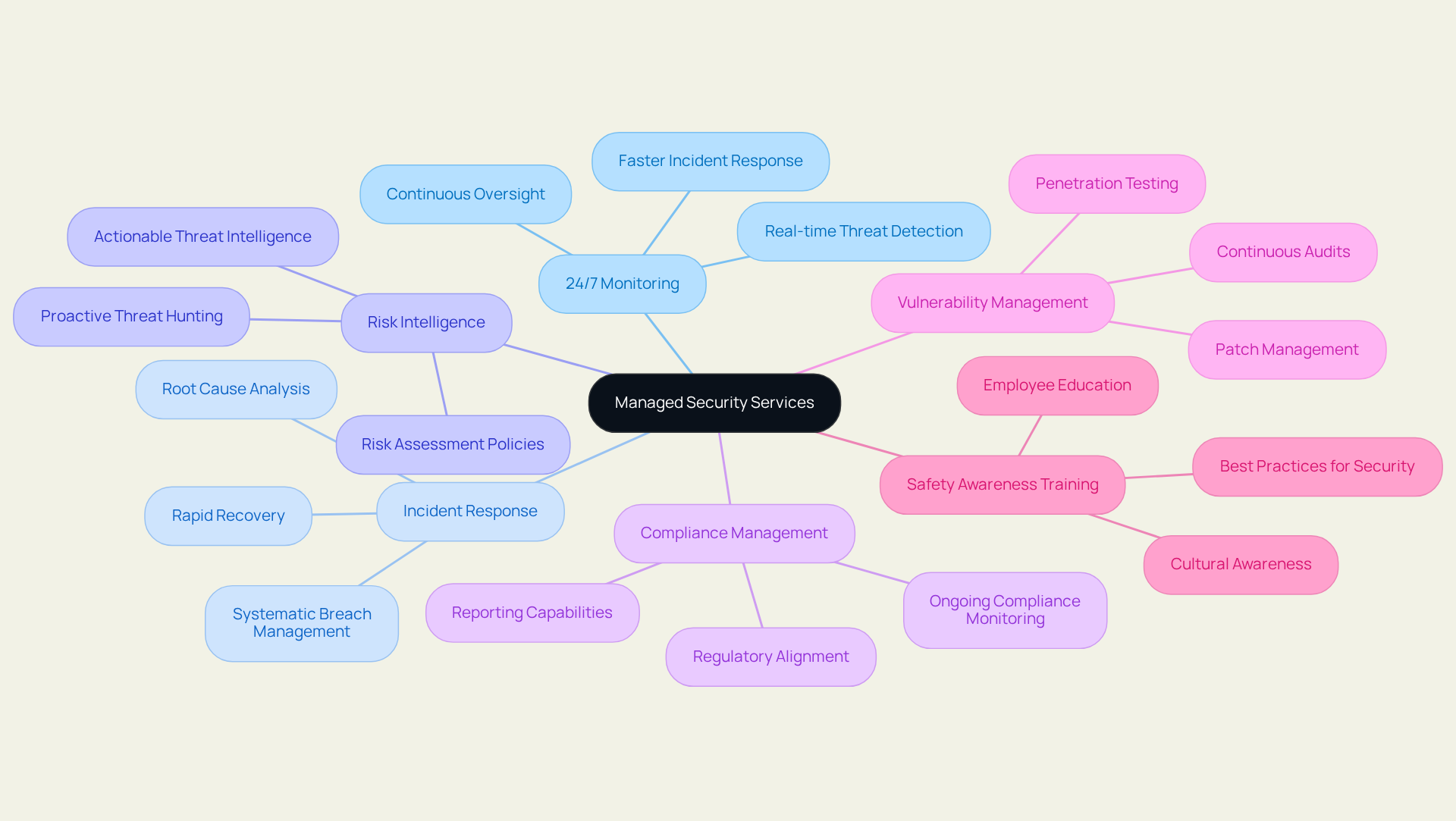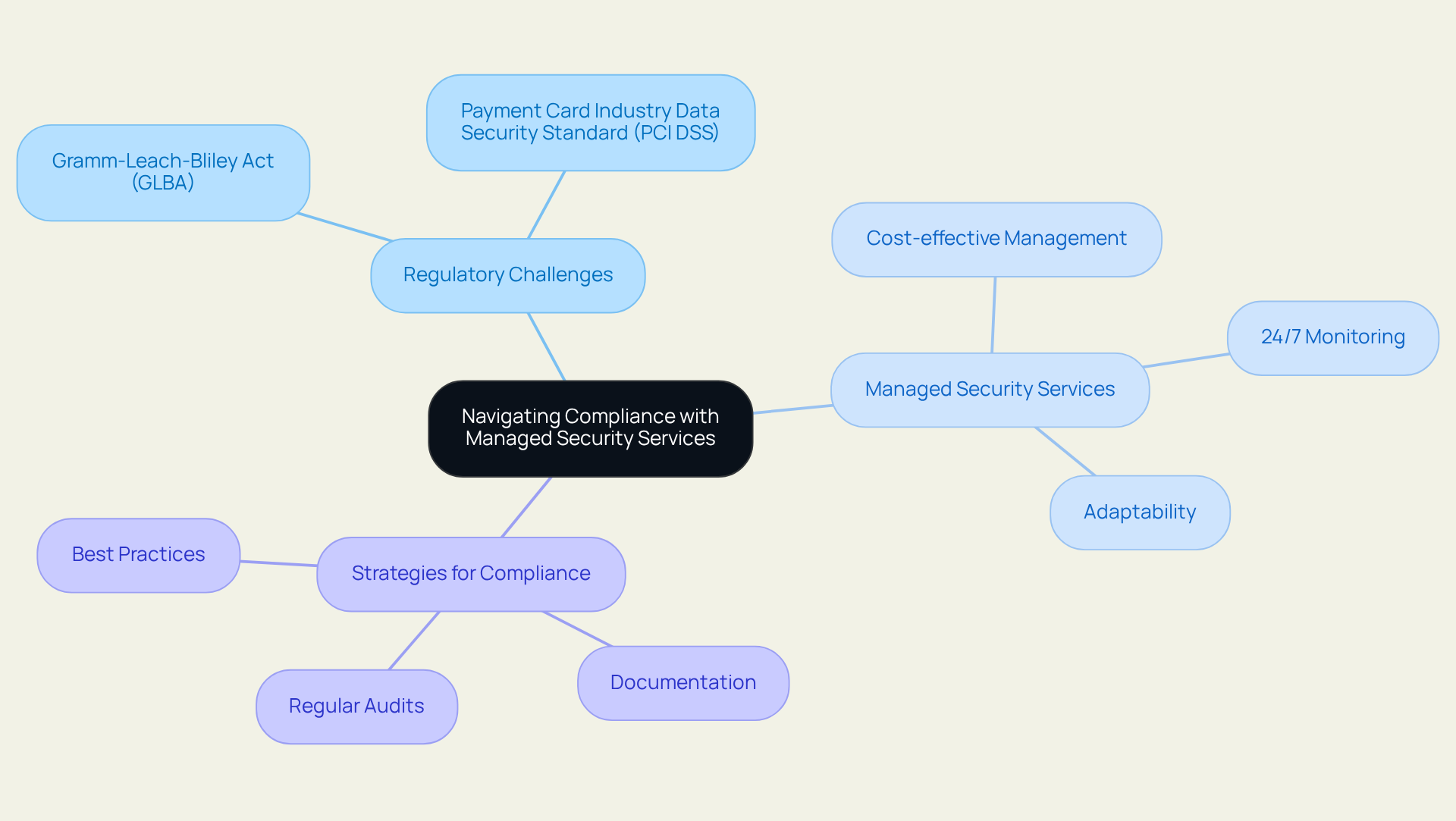Overview
Managed Security Services (MSS) for financial institutions represent a critical component of outsourced cybersecurity solutions, meticulously crafted to safeguard against the ever-evolving landscape of cyber threats while ensuring compliance with rigorous regulations. These services, encompassing 24/7 monitoring, incident response, and risk intelligence, empower financial organizations to significantly bolster their security posture.
By reducing incident response times and maintaining adherence to regulatory standards such as GLBA and GDPR, these solutions foster customer trust and enhance operational resilience. Financial institutions that leverage MSS not only protect their assets but also position themselves as leaders in the commitment to cybersecurity excellence.
Introduction
The financial sector stands increasingly vulnerable to sophisticated cyber threats, underscoring the imperative for robust cybersecurity solutions. Managed Security Services (MSS) emerge as a vital lifeline for financial institutions, delivering a comprehensive suite of outsourced security measures tailored to navigate the intricate landscape of cyber risks. As the regulatory environment tightens and cyber threats evolve, the pressing question arises: how can financial organizations effectively leverage these services to protect sensitive data while ensuring compliance and operational resilience?
Defining Managed Security Services for Financial Institutions
Managed security services for financial institutions constitute a comprehensive suite of outsourced cybersecurity solutions meticulously crafted to shield monetary organizations from the ever-evolving landscape of cyber risks. These services encompass ongoing monitoring, threat identification, incident handling, and compliance oversight—elements that are indispensable for maintaining a robust protective posture in a domain where the stakes are exceptionally high.
By 2025, a significant portion of monetary establishments is expected to adopt managed security services for financial institutions, driven by the increasing complexity of regulatory demands and the urgent need for enhanced protective measures. MSS providers leverage advanced technologies and skilled personnel, enabling organizations to focus on their core operations while ensuring that their cybersecurity frameworks are fortified.
This model is vital as monetary institutions face heightened scrutiny regarding and customer privacy, necessitating a proactive approach to safeguarding sensitive information. As Kory Daniels, a CISO, articulates, 'Digital trust is essential for monetary services to effectively operate in a hyper-competitive market.'
The integration of managed security services for financial institutions not only bolsters security but also facilitates compliance with regulations such as GLBA and GDPR, making it an essential component of contemporary economic operations.

The Importance of Managed Security Services in the Financial Sector
In the economic sector, the importance of managed security services for financial institutions is paramount. As cyber dangers grow more advanced, monetary establishments face constant pressure to protect sensitive client information, which has resulted in the increased reliance on managed security services for financial institutions to comply with strict regulatory standards. Statistics indicate that 65% of monetary institutions faced ransomware attacks in 2024, highlighting the pressing requirement for strong protective measures. Managed security services for financial institutions offer a proactive method for protection, enabling institutions to identify and respond to risks in real-time, which is crucial given that 90% of all cyber incidents begin with a phishing email.
By outsourcing protective functions to specialized providers like JSOC IT, financial organizations can benefit from managed security services for financial institutions, gaining access to advanced technologies and expertise that may be challenging to maintain internally. JSOC IT's customized protective measures, including:
- Threat detection and response
- Managed services
- Compliance support
have proven instrumental in assisting clients significantly reduce incident response times and enhance compliance readiness. This tactical action not only but also enables organizations to focus on their primary business goals, encouraging growth and innovation. For example, a leading banking entity effectively enhanced its incident response times and compliance preparedness through JSOC IT's tailored solutions, showcasing the concrete advantages of outsourced security services.
As the environment of cyber risks keeps changing, collaborating with managed security services for financial institutions, such as JSOC IT, is a solid suggestion for banks seeking to strengthen their protections and guarantee operational resilience.

Key Components and Characteristics of Managed Security Services
Key components of Managed Security Services for financial institutions are paramount in today’s digital landscape:
- 24/7 Monitoring: Continuous observation of networks and systems is critical for identifying and responding to threats in real-time. Financial organizations that implement round-the-clock monitoring can detect and address incidents 50% faster than those lacking such services, significantly mitigating potential damage and downtime. Jason Miller states, "24/7 monitoring is an essential element of cybersecurity, offering constant oversight to identify and react to risks in real-time." This monitoring is reinforced by a robust Secure Development Policy and Change Management Policy, ensuring that all changes are tracked and vulnerabilities are promptly addressed.
- Incident Response: A systematic approach to managing and mitigating breaches ensures rapid recovery and minimal impact. In the event of an identified threat, continuous surveillance enables financial institutions to swiftly isolate and address security incidents, reducing the likelihood of extensive damage. This rapid response capability is vital for minimizing downtime and safeguarding critical financial systems from disruption. The Incident Response Plan and insights gained from previous incidents are integral to refining these processes.
- Risk Intelligence: Utilizing information from various sources empowers organizations to anticipate and prepare for potential cyber threats. Managed security services for financial institutions provide actionable intelligence on dangers, helping businesses stay ahead of adversary tactics and attack trends—essential for effective incident response. Proactive threat hunting is crucial for identifying vulnerabilities before they can be exploited, supported by a comprehensive Risk Assessment and Treatment Policy.
- Compliance Management: Ensuring that protective measures align with regulatory requirements, such as GDPR, PCI DSS, and others specific to the financial sector, is essential. Ongoing compliance monitoring aids institutions in meeting these regulatory obligations by providing oversight and comprehensive reporting, thereby enhancing their overall protective posture. Compliance-driven protection frameworks simplify the process of adhering to regulatory requirements, ensuring that all policies, including Data Retention and Disposal, are followed.
- : Regular evaluations and updates are necessary to identify and rectify weaknesses in security. MSSPs conduct continuous audits and penetration testing, ensuring that configurations are optimized and aligned with business needs, thus preventing costly breaches. Ongoing protection optimization is crucial, as cybersecurity requires continual enhancement and adjustment to avert vulnerabilities and misconfigurations, as outlined in the Vulnerability and Patch Management Policy.
- Safety Awareness Training: Educating employees about best practices for security reduces human errors, often a significant factor in breaches. By fostering a culture of awareness, organizations can fortify their defenses against potential threats. This proactive approach not only protects sensitive financial data but also ensures regulatory compliance and maintains customer trust.
These components work synergistically to create a robust security framework that not only protects sensitive information but also enhances the overall resilience of organizations against cyber threats. The integration of these services ensures that organizations can adeptly navigate the evolving threat landscape, preserving customer trust and adhering to industry standards.

Navigating Compliance and Regulatory Challenges with Managed Security Services
Navigating compliance and regulatory challenges is paramount for financial entities, particularly in light of stringent regulations such as the Gramm-Leach-Bliley Act (GLBA) and the Payment Card Industry Data Security Standard (PCI DSS). These regulations mandate robust protective measures to safeguard sensitive customer information and ensure data integrity. JSOC IT's managed security services for financial institutions provide extensive outsourced management with 24/7 monitoring, ensuring continuous protection against evolving threats while also offering cost-effective management solutions.
Managed security services for financial institutions play a critical role in maintaining compliance through:
- Comprehensive documentation
- Regular audits
- Implementation of industry best practices
This proactive strategy not only enables organizations to demonstrate adherence during but also enhances their overall protective posture. Notably, financial organizations utilizing managed security services for financial institutions from JSOC IT have reported significant improvements in their compliance preparedness, with 34% of risk management professionals identifying cyber incidents as the foremost risk for businesses globally in 2023.
Moreover, as regulations evolve, JSOC IT remains vigilant, adjusting protective strategies to effectively mitigate compliance risks. This adaptability is essential, especially given that non-compliance can result in severe penalties, including fines of up to $20 million or 4% of global revenue under GDPR. Real-world examples underscore the efficacy of JSOC IT's managed security services for financial institutions in facilitating compliance with GLBA and PCI DSS, illustrating how institutions can establish a fortified security framework while adeptly navigating the complexities of regulatory demands.

Conclusion
The integration of managed security services for financial institutions signifies a pivotal advancement in the protection of sensitive financial data amid an increasingly intricate cyber threat landscape. By outsourcing cybersecurity functions to specialized providers, monetary organizations can not only bolster their protective measures but also ensure compliance with rigorous regulatory requirements. This proactive strategy is vital for sustaining digital trust and operational resilience in a fiercely competitive market.
Throughout the discourse, essential components such as:
- 24/7 monitoring
- Incident response
- Risk intelligence
- Compliance management
have been underscored as foundational aspects of effective managed security services. These services empower financial institutions to swiftly detect and respond to threats, significantly reducing incident response times and enhancing compliance readiness. Real-world examples, such as the successful strategies employed by organizations like JSOC IT, illustrate the concrete benefits of implementing these robust security frameworks.
As the financial sector continues to navigate the evolving landscape of cyber risks and regulatory challenges, the significance of managed security services cannot be overstated. Financial institutions are urged to adopt these solutions not only to safeguard their assets but also to cultivate a culture of security awareness and compliance. By prioritizing managed security services, organizations can effectively mitigate risks, enhance customer trust, and secure their operations against the backdrop of a rapidly changing digital environment.
Frequently Asked Questions
What are managed security services for financial institutions?
Managed security services for financial institutions are outsourced cybersecurity solutions designed to protect monetary organizations from cyber risks. They include ongoing monitoring, threat identification, incident handling, and compliance oversight.
Why are financial institutions expected to adopt managed security services by 2025?
Financial institutions are expected to adopt managed security services by 2025 due to the increasing complexity of regulatory demands and the urgent need for enhanced protective measures against cyber threats.
What advantages do managed security service providers offer to financial institutions?
Managed security service providers offer advanced technologies and skilled personnel, allowing organizations to focus on their core operations while ensuring their cybersecurity frameworks are strengthened.
Why is digital trust important for monetary services?
Digital trust is essential for monetary services to operate effectively in a hyper-competitive market, as it ensures data protection and customer privacy, which are critical for maintaining customer confidence.
How do managed security services assist with regulatory compliance?
Managed security services help financial institutions comply with regulations such as the Gramm-Leach-Bliley Act (GLBA) and the General Data Protection Regulation (GDPR), making them a crucial part of modern economic operations.






